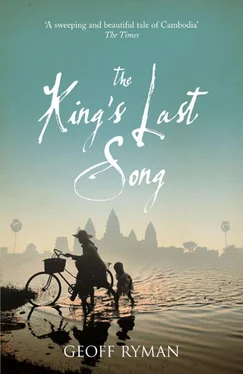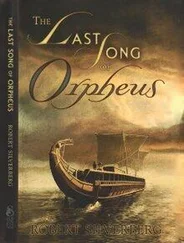Nia laughed at his own joke and this time, some of the other children joined in. The older boy’s eyes went dark, and seemed to withdraw like snails into their shells.
Endure. That was the main task of a royal child.
Suddenly, at last, the elephant lurched forward. They were on their way! The Prince stood up higher, propping his thighs against the railing. He could see everything!
They rocked through the narrow passageway towards the main terrace. Nia finally saw close up the sandstone carvings of heavenly maidens, monsters, and smiling princes with swords.
They were going to leave the royal house. I’m going to see them, thought the Prince; I’m going to see the people outside!
They swayed out into the royal park.
There were the twelve towers of justice, tiny temples that stored the tall parasols. Miscreants were displayed on their steps, to show their missing toes.
The howdah dipped down and the Prince saw the faces of slave women beaming up at them. The women cheered and threw rice and held up their infants to see. No men, their men were all in the parade as soldiers.
Beyond them were their houses – small, firm and boiled clean in tidy rows. Planks made walkways over puddles. The air smelled of smoke, sweat, and steaming noodles. The Prince tried to peer through the doorways to see what hung from the walls or rested on the floors. Did they sleep in hammocks? What games did the children play?
‘What are you looking there for, the tower’s over there!’ said one of the boys and pointed.
Tuh. Just the Meru, the Bronze Mountain. They could see that any day. Its spire was tall, but everybody said that the King’s great new temple was taller.
The road narrowed into shade and they passed into the market. The Prince saw a stall with an awning and a wooden box full of sawdust. Ice! It came all the way from the Himalayas on boats in layers of sawdust. He saw a Chinese man press a chip of it to his forehead. He had a goatee, and was ignorant enough to wear royal flower-cloth. The Khmer stall-wife was smiling secretly at him.
The howdah slumped the other way. The Prince saw sky and branches; he steadied himself, clinging to the rail, and looked down. Beyond the stalls were ragged huts, shaggy with palm-frond panels. A woman bowed before a beehive oven of earth, blowing air into it through a bamboo pipe.
The air smelled now of rotten fruit and latrines. The Prince saw a dog chomp on the spine and head of a fish.
Splat! The little girl squealed in fear. Over-ripe rambutan had splattered over their shoulders. Overhead, boys grinned from the branches of trees and then swung down. One of the kamlaa took off after them with a stick.
Along the road, other people watched in silence.
One of them gazed back at Nia. His mouth hung open with the baffled sadness of someone mulling over the incomprehensible. How is it, he seemed to ask, that you stand on an elephant in flowered cloth, and my son stands here with no clothes to wear at all?
The man standing next to him was so lean that every strand of muscle showed in lines like combed hair. His gaze turned to follow the howdah, insolent, fierce, and angry.
These were the great people of Kambujadesa? The young prince didn’t like them at all. They were ugly, their houses were ugly, and they smelled.
This was Yashodharapura, abode of the Gods, the perfect city. The soldiers should come and take away all such people.
The procession moved on, into the precinct of the holy mountain, Yashodharaparvata.
Here in the old centre of the City, everything was better. Wives of temple workers, all of them royal tenants, waved tiny banners. Their hair was held in handsome fittings, and they wore collars of intricate bronze.
Nice people, smiling people. They dipped and bowed and held up their hands for princes, as was fitting.
Their houses stood on firm stilts and were linked by covered walkways. Airy cloth bellied outward from the rooms. The Prince glimpsed the canals beyond, full of boats. Amid fruit trees, carved stone steps led down to small reservoirs.
Prince Nia turned around and saw stone steps going all the way up the miraculous hill of Yashodharaparvata. The trees were hung with celebratory banners, and the gates to the hilltop temple had sprouted poles that supported ladders of coloured cloth. From the top of the hill, golden kites swooped and dipped. The kites reflected white sunlight that continued to dapple the inside of the Prince’s eyes long after he looked away.
The procession passed into orchards and rice fields and dust began to drift over the howdah like smoke.
Suddenly they came upon a new, raw desert. All the trees had been cleared, their fresh yellow stumps staring out of the earth. Dust blew as if out of a thousand fires, and above rose the new temple, the Vishnuloka .
The Prince was disappointed. The five towers were not that much bigger than the spire of Mount Meru. They were made of raw uncarved stone, unfinished and undecorated blocks that bore down on each other. The towers looked like the toy buildings he himself made out of clay cubes. Some banners trailed limply from the scaffolding.
Ahead of them, pickaxes rose and fell out of a great ditch. Men struggled up the banks, passing baskets of dirt to queues of women and children who swept the baskets away hand-to-hand into the distance. Boys ran back with empty baskets. To the Prince the workers looked like busy termites swarming around their nests.
More banners bobbed on poles that marked where the entrance would be. The elephant passed between them and rocked the children up onto a causeway that crossed the moat. The moat looked like a dry riverbed running due north, sweltering with a few puddles.
The elephant did a slow dance round to join a row of waiting elephants. The Prince saw the puffy faces of other children in howdahs sagging in the sun. They waited again, on a plain of churned earth.
The Prince craned his neck to the right. ‘I can’t see the rest of the parade,’ he said.
‘Aw, poor little baby,’ said the boy whose feet had been peed on.
Another elephant full of unwanted princes churned up the dust and came to rest beside them. Dust polished the Prince’s eyes every time he blinked.
Finally an elephant strode past them, shaded by two heaving parasols. The howdah was carved and balanced on a beautiful rug, and on it stood a high-born warrior. He wore a felt coat and a diadem and a bronze tiara, rising up like an open lotus. He stood holding his arrows in his hand.
That was more like it!
White horses pranced, lifting their feet high, but holding to formation. Their riders rode on their unsaddled backs, hands on hips.
Behind the horsemen came a ballistic elephant, a crossbow on its back. Its protecting infantry marched in rows alongside it.
A third elephant followed, with a solid shell of wood over its back. Resting one foot outside the ornate howdah, a real warrior prince stood in full armour with a crown and a metal breastplate tied across his chest.
Prince Nia squealed in delight, and leaned so far out of the howdah that he nearly fell.
Soldiers trooped past. These were nobles. They wore flower-cloth chemises and their topknots were held in metal tiaras in the shape of totemic beasts: eagles or tigers or deer, which showed that they were fast, or fierce.
More horses wheeled past, white like falling water. The Prince’s military heart danced. Then, oh! Their riders stood up and pulled back their bows and let loose flaming arrows. They arched up into the blue sky over the southern moat.
Nia was beside himself. He yelled and shouted and pummelled the shoulders of the bigger boys next to him. Suddenly affectionate, they laughed with him, pleased by his fervour, sharing it.
‘Steady, Little Warrior,’ one of them chuckled.
Читать дальше












